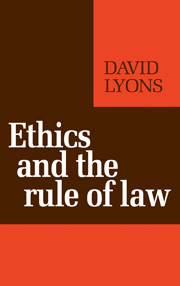1 - Moral judgment and the law
Published online by Cambridge University Press: 19 January 2010
Summary
In our everyday affairs, we judge laws to be good or bad, just or unjust. Our judgments are of practical importance. We consider ways to make law better, and we engage in political activities which range from voting to movements for reform. We discuss these matters with each other and debate them in the political arena.
Our political discussions seem to presuppose that moral judgments are not, or need not be, fundamentally arbitrary. We offer arguments for the positions that we take, and we seek to answer arguments for opposing views. While each of us is likely to have some firm moral convictions, we often recognize that some of our specific judgments might be mistaken. All of this suggests that there are right and wrong answers to moral questions.
But we may come to wonder whether this is really true. Most of us are uncertain about the principles to be used in evaluating law and human conduct generally. We favor freedom, equality, and the common good, but we are unclear about what these ideas mean, how sound principles may be formulated, and even whether any moral standards can rationally be defended.
Our skeptical doubts about morality may be reinforced by reflection on the contrast between science and ethics, a familiar theme in this age of scientific progress. It is often said that science deals with facts, which are outside of us and objective, while ethics is concerned with values, which are in us and subjective. Facts can be observed, or at least they can be verified by empirical techniques. But values (it is said) do not describe the world; they express our wishes, hopes, desires, attitudes, or preferences.
- Type
- Chapter
- Information
- Ethics and the Rule of Law , pp. 5 - 35Publisher: Cambridge University PressPrint publication year: 1983



